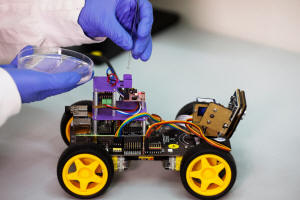|
Locusts have an acute sense of smell, which the researchers in Tel
Aviv University have managed to harness to their bio-hybrid robot,
making it far more sensitive than existing electronic sniffers, they
said.
Locusts smell with their antennae. On the four-wheeled robot, the
researchers placed the insect's antenna between two electrodes that
send electrical signals as a response to a nearby odour. Each scent
has a unique signature which, with machine learning, the robot's
electronic system can identify.
"Ultimately, we are trying to create a robot with a sense of smell
that will be able to distinguish between smells and to locate them
in space," said Neta Shvil of the Sagol School of Neuroscience.
As scientists try to understand how some animals detect disease by
smell, fellow developer Ben Moaz said the future applications would
almost be endless, extending to the detection of drugs and
explosives and even food safety.
"We are overwhelmed with possibilities," said Maoz of the Fleischman
Faculty of Engineering and Sagol School of Neuroscience.
(Reporting by Rami Amichay; Writing by Maayan Lubell; Editing by
Arun Koyyur)
[© 2023 Thomson Reuters. All rights
reserved.] Copyright 2022 Reuters. All rights reserved. This material may not be published,
broadcast, rewritten or redistributed.
Thompson Reuters is solely responsible for this content.
|
|




